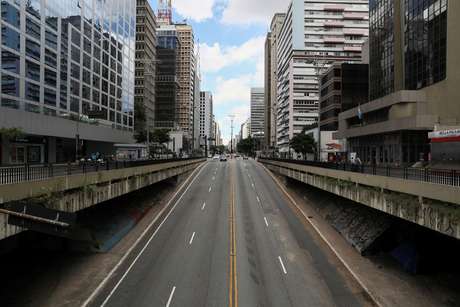RIO DE JANEIRO, BRAZIL – The majority of Brazilians are in favor of the lockdown, the radical confinement measure to fight the spread of the coronavirus, although people in quarantined cities because of the pandemic have been leaving their homes the most.
This is the finding of a Datafolha survey on Monday and Tuesday, May 25th and 26th, when 2,069 adults were interviewed by telephone using standard protocals. The error margin is two percentage points plus or minus.
For 60 percent of respondents, quarantine is recommended, while 36 percent are against it, two percent were unable to answer and one percent say they are indifferent-
Lockdown was implemented without tangible success in places like Belém, and has been the subject of discussion in São Paulo. It had been advocated by the Mayor of the capital, Bruno Covas, but is now rejected by Governor João Doria.

The wealthiest, earning over ten minimum wages, are also the most resistant to the idea: 50 percent are against it, tied with 47 percent in favor.
Support for the idea is higher in the Northeast, a region that throughout the crisis has proved to be more opposed to the policies of President Jair Bolsonaro, who is more concerned with the economy and rejects social isolation. There, 69 percent are in favor of a lockdown. With 54 percent support, the South region, the Bolsonarist stronghold, is the least favorable.
Datafolha shows that, despite supporting a lockdown and the priority of remaining at home, when faced with the need to work for the economy, Brazilians have been less and less adhering to social isolation.
Those leaving home while claiming they are careful are 35 percent. In the three previous surveys, on April 1st to 3rd, April 17th and April 27th, the rates were 24, 26 and 27 percent, respectively. Those who say they leave only when it’s inevitable remain the largest group, 50 percent, stable when compared to the preceding survey.
Women leave the home less, and 25 percent are in the “I am taking care, but I go out” category, compared to 46 percent of men. Women are also more favorable to confinement, 68 percent, while the concept has the support of 52 percent of men.
Those who have been in total isolation have dropped from 16 to 13 percent. Brazilians over the age of 60, theoretically the most vulnerable to Covid-19 complications, are the ones staying at home the whole time: 21 percent.
The concept that people who are not in high-risk groups should be allowed to leave home, has also grown in support, despite the fact that the disease has proven to be quite democratic in its nature. Currently, 52 percent advocate this, compared to 46 percent who feel that everyone should be isolated to contain the virus. On April 27th, the rates were the exact opposite.
Despite these figures, the benefits of social isolation are perceived as such by the majority. For 65 percent, it is more important for people to stay home than to restart the economy with the return to the streets and reopening of non-essential business.
The number remains stable in comparison to the last two surveys, but lower than the 76 percent recorded in the April 1st to 3rd survey. Those who believe it is time to relax social isolation have grown from 18 percent in that survey to 28 percent in the current one. Here, the occupation of respondents is very significant.
Entrepreneurs are the ones most opposed to keeping people at home, even if it leads to more unemployment: 51 percent, while 39 percent of them feel that the priority is isolation. The lockdown is rejected by 55 percent of entrepreneurs, compared to 38 percent who approve of it.
Students are on the other end, with 83 percent supporting staying at home, while 16 percent want quarantine rules relaxed.
Brazilians are pessimistic about the length of the crisis, which has impacted the daily lives of large Brazilian cities since late March. The largest segment among respondents, 40 percent, believes that the country will only return to normality within four months to a year.
For nine percent, this will occur within one to two months, ten percent see a rebound in two to three months, and eight percent see a rebound in three to four months. Youths between the ages of 16 and 24, those with higher schooling and the wealthiest are more pessimistic.

